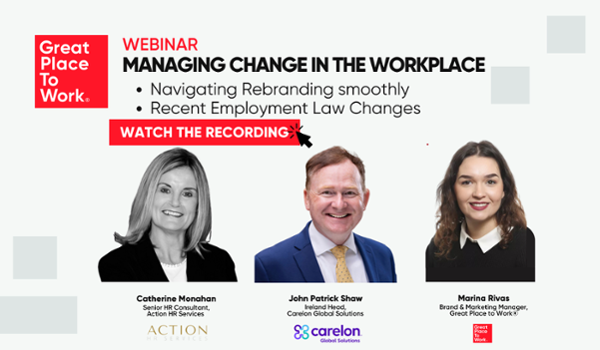
Staying up to date with changing employment laws is of paramount importance for organisations in today's dynamic business landscape. Employment laws govern the relationship between employers and employees, encompassing crucial aspects such as hiring, working conditions, compensation, benefits, and termination procedures. As these laws continually evolve due to shifts in societal norms, economic conditions, and legal precedents, organisations must remain well-informed to ensure compliance and mitigate potential legal risks. Failing to stay current with these laws could lead to costly lawsuits, reputational damage, and regulatory penalties.
Last week we hosted our last webinar of the summer, where we covered important changes in Irish employment law, including what needs to be kept in mind for essential changes in these laws in the coming months. Catherine Monahan, Senior HR Consultant with Action HR Services talked us through these changes in detail, and we've summarised them below as a handy cheat sheet for you to refer back to when you need!
The European Union (Transparent and Predictable Working Conditions) Regulations 2022
This new legislation was signed into Irish law on 16th December 2022 to protect individuals in all forms of work by promoting more transparent and predictable employment while at the same time ensuring labour market adaptability for employers.
The regulations have brought about a lot more obligations for employers. The key changes are:
Information Deadlines
The regulations provide for two information deadlines regarding contracts of employment. Previously, employers were required to provide employees with five core terms of employment within five days of commencement of employment. This obligation has now been extended; employers are now required to provide employees with ten core terms within the first five days. As well as this, previously, employers were required to give the full contract of employment, or the remaining terms and conditions, within two months; this has now changed to one month.
There are also changes to the written statement that has to be given to employees who work outside of Ireland, and changes for posted workers. The regulations helpfully outline the form of statement that is to be provided to employees, which are that it is to be:
- In writing
- Signed and dated on behalf of the employer
- Transmitted on paper, or is accessible to the employee, which can be printed and stored and the employer must retain proof of transmission or receipt in electronic form.
Another important change for employers is that previously, if an employer wanted to make a change to the information they provided to employees, it had to be done within one month. Now it must be done on or before the date the change takes place.
Probationary periods
Previously, there was no legislation requiring an employer to limit the length of a probationary period. However, these new regulations state that where an employee is subject to a probationary period, it cannot exceed six months. The legislation does state this can be extended only on an exceptional basis and where a longer period is in the employee's interest. However, this additional exceptional period cannot exceed 12 months.
Interestingly, the regulations do state that if an employee is absent due to a specified provision, such as protected leaves like maternity/paternity leave, carers leave, etc., then the probationary period can be extended to the length of that absence.
The regulations also provide us with information around fixed term contracts. If an employee is on a fixed term contract, their probationary period must be proportionate to the length of the contract and to the nature of the work. It also says if you are renewing the fixed-term contract, there should not be another probationary period, as there was already one previously.
Transition to more predictable work
Also included in the regulations is "transition to more predictable work". This is where an employee, who has completed their probationary period and has been in continuous service with an employer for at least six months, may request a form of employment with more predictable and secure working conditions, where available, and receive a reply from their employer within one month of the request. An employee can make such a request once in any twelve-month period.
Parallel Employment/Exclusivity Clauses
A lot of contracts of employment have exclusivity clauses, that is, you can only work for this specific employer and not someone else. In the regulations, this is referred to as "parallel employment".
The regulations state that an employer should not prohibit an employee from working for another employer or treat an employee adversely for taking up employment with
another employer. This is certainly a big change, however the regulations do go on to say that the employer can restrict the employee from working for another employer where it’s proportionate and based on objective grounds; this is called an incompatibility restriction.
If an employer wishes to impose an incompatibility restriction on the employee, they must outline the details of this restriction and the objective grounds on which it is based to the employee in the written contract, or alternatively, in a separate written statement. Possible objective grounds could include health and safety reasons, protecting business confidentiality, avoiding conflicts of interest, etc.
Mandatory training
This part of the regulations states that an employer is required by law to provide training to an employee so that they can carry out their role. such training must:
- Be provided to the employee free of cost
- Count as working time
- Where possible, take place during working hours
Amendment to the Organisation of Working Time Act 1997
The regulations amend the Organisation of Working Time Act 1997 Section 17, which states that employees must be given a minimum notice period of 24 hours of their work assignment. However the new regulations also state that any work assignment notified to an employee must take place within the reference hours and days notified to the employee as part of their written terms. If either of these requirements are not met, the employee has the right to refuse the work assignment without adverse consequences.
Check out more resources from us below:
- The Evolution of Employee Experience: What to expect in 2023
- How can Organisations Foster Trust in the Workplace?
- How to Support and Engage Hourly Employees
- Building a Great Place to Work: The Role of Aura's People-Centric Culture
Sick Leave Act 2022
This act was enacted in January of this year. It entitles employees to a maximum of 3 days of employer-paid sick leave in any one calendar year, provided the employee has done 13 weeks of continous service and they provide a medical certificate. That entitlement is to increase to 5 days in 2024, 7 days in 2025 and 10 days in 2026.
From a payment perspective, the employer is required to pay 70% of the employee’s
normal wages subject to a maximum of €110 per day. The legislation states, should the company already have a sick leave policy with terms as, or more favourable, to their employees, there is no requirement to pay an additional 3 days.
The Protected Disclosures (Amendment) Act 2022
Ireland’s Protected Disclosures Act 2014 sets out how wrongdoing can be reported and how reporting persons ("whistleblowers") are to be protected from penalisation. The Protected Disclosures (Amendment) Act 2022 amends the original legislation and there are now new obligations an employer must fulfill.
This new act significantly enhances the protection for whistleblowers in Ireland. Since 1st January 2023, organisations with more than 250 employees have been required to have formal internal channels and procedures for their workers to make protected
disclosures. However, from 17th December 2023, organisations with 50 or more employees will have the same requirement.
The Act widens the scope of people who can make a protected disclosure to include:
- Persons applying for jobs - if someone is in the recruitment process, in pre-contractual negotiations etc.
- Persons undergoing training
- Shareholders
- Members of boards
- Volunteers
The scope of penalisation has also been expanded to include:
- Negative performance assessments
- Failure to renew a temporary contract
- Harm to reputation via social media
- Psychiatric or medical referrals
Catherine advises employers to make sure they are keeping good records, and have an objective justification for any acts they take in this regard. It is also worth noting that there is now a reversal of burden of proof, in that employers will now have to disprove penalisation claims.
Work Life Balance and Miscellaneous Provisions Act 2023
This legislation applies to all employees and the purpose of the act is to provide for the entitlement of certain employees to leave for medical care purposes, domestic violence leave, to request flexible working arrangements for caring purposes and to provide for the entitlement of employees to request remote working arrangements.
Medical care purposes: This consists of 5 days unpaid leave in any period of 12 consecutive months to provide personal care/support to a care recipient for serious medical reasons. The recipient can be the child, spouse, civil partner, cohabitant, parent, grandparent, sibling or housemate of the employee. The entitlement is on commencement of employment, so there is no service requirement.
The entitlement is also in addition to existing statutory entitlements to carers leave and Force Majeure Leave. As an employer, you may request evidence from the employee as to the relationship with the person, the nature of the care that they require and evidence relating to the need of the person, eg medical certificate.
Domestic violence leave: To be introduced in autumn, this leave provides for the introduction of 5 days of domestic violence leave in any period of 12 consecutive months. It is set to be fully paid, and workers will have to disclose the type of leave they are taking, however they will not have to provide any evidence of proof of abuse. Regulations are currently being developed to set out rate of pay and guidance for
employers currently being developed by Womens Aid.
The right to request remote working: All employees will have a right to request remote work after 6 months of continuous service. They must give the employer 8 weeks’ notice in writing of their request. The employer will be required to consider such requests in accordance with its needs, the needs of employees and a new Code of Practice to be developed by the Workplace Relations Commission.
The employer must reply in writing within 4 weeks of receiving the request, either to approve the request with an agreement between themselves and the employee, or to refuse the request, in which case the reasons must be set out in writing. Alternatively, they can extend the time period to a maximum of 12 weeks if they are having difficulty assessing the viability of the request.
The right to request flexible working arrangements for parents and carers must follow a similar procedure, and in the case of caring for a person such as a child or a sick person, additional information may be requested, such as a birth certificate or a medical certificate.
Catherine also touched on 3 bills being worked on at the moment which are due to be enacted in the future with no date confirmed as of yet:
Employment Permits Bill 2022: This Bill was first introduced in October 2022 in order to make the permits system more responsive to the evolving labour market. The core policy of the system remains unchanged and employment opportunities should only be offered to non-EEA nationals where there is no suitable EEA candidate to fill
the vacancy. The bill will introduce two new permits; a seasonal employment permit and a contract for services permit. It will also attach conditions such as training or
accommodation to the granting of employment permits in certain situations.
Living Wage Bill 2022: A National Living Wage will replace the National Minimum
Wage from 2026. The Living Wage will be set at 60% of the median wage in any
given year. The most recent Low Pay Commission report is recommending an
increase in the National Minimum Wage in 2024 of 12%, or €1.40 an hour which will bring the National Minimum Wage to €12.70 per hour.
Automatic Enrolment Retirement Saving System Bill 2022: The purpose of this is for all workers to have workplace pension in addition to their statutory pension. It is expected to be in place by the end of 2024, and the bill as it currently stands will see everyone earning over €20,000 a year and aged between 23 and 60 automatically enrolled in a new retirement savings system where employees do not have an occupational pension.
There is a lot of work still to be done for this bill, but it is expected for it be brought in gradually. Employer and employee contributions start at 1.5% of gross salary, auto-escalating every three years, until reaching the maximum contribution rate
of 6% on Year 10. The state will make a contribution – for every €3 employee puts in, employer will also put in €3 and the State will top up by €1. Employees can opt out or suspend contributions after 6 months of service.
Check out the full webinar recording below 👇
About Great Place to Work®
Great Place to Work® is the global authority on workplace culture. We help organisations quantify their culture and produce better business results by creating a high-trust work experience for all employees. We recognise Great Place to Work-Certified™ companies and the Best Workplaces™ in more than 60 countries.
To join the thousands of companies that have committed to building high-trust company cultures that help them attract, retain and take care of their people, contact us about getting Certified™ today.
 Argentina |
Argentina |  Australia |
Australia |  Austria |
Austria |  Belgium |
Belgium |  Bolivia |
Bolivia |  Brazil |
Brazil |  Canada |
Canada |  Central America & Caribbean |
Central America & Caribbean |  Chile |
Chile |  Colombia |
Colombia |  Denmark |
Denmark |  Ecuador |
Ecuador |  Finland |
Finland |  France |
France |  Germany |
Germany |  Global |
Global |  Greater China |
Greater China |  Greece |
Greece |  Hong Kong SAR |
Hong Kong SAR |  India |
India |  Ireland |
Ireland |  Italy |
Italy |  Korea |
Korea |  Luxembourg |
Luxembourg |  Mexico |
Mexico |  Nigeria |
Nigeria |  Norway |
Norway |  Paraguay |
Paraguay |  Peru |
Peru |  Poland |
Poland |  Portugal |
Portugal |  Qatar |
Qatar |  Saudi Arabia |
Saudi Arabia |  Singapore |
Singapore |  Sri Lanka |
Sri Lanka |  Sweden |
Sweden |  Switzerland |
Switzerland |  The Netherlands |
The Netherlands |  Turkey |
Turkey |  United Arab Emirates |
United Arab Emirates |  United Kingdom |
United Kingdom |  United States |
United States |  Uruguay |
Uruguay |  Venezuela |
Venezuela | %20}})
-4.png?width=2160&height=2160&name=2021_gptw_logo_primary_red%20(1)-4.png)







